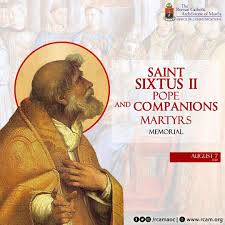HOMILY WEEK 18 03 – Year II
Persistent Faith:
Optional Memorial of St. Sixtus II and Companions
(Jer 31:1-7; Jer 31:10-13; Mt 15:21-28)
********************************************************
There is a very significant faith process at work in the readings today, calling us to have humble and persistent faith in Jesus; to come to him for forgiveness and healing, and to respond with joyful worship and a commitment to justice.
First, we have the familiar pattern of God’s unconditional and faithful love in the face of Israel’s infidelity. Jeremiah presents God’s promise to ransom and restore the remnant of Israel – to forgive and heal her. Israel’s response to that love is to be joyful praise and worship; to be obedient sheep led by their shepherd.
In the gospel, we see that schema being stretched to be more inclusive. Jesus, although he goes to the pagan territory of Tyre and Sidon, tries to be faithful to the original, limited plan of his two-fold mission to Israel – to redeem and sanctify her alone.
However, he runs into one of only two persons in all the Gospels who are described as having great faith, this Canaanite woman, and the centurion who told Jesus the words we imitate at every Eucharist, “Speak but the word and my servant will be healed.”
This is an extra-ordinary process and event. In his effort to stay faithful to his Israel-alone mandate, Jesus rebuffs the woman’s pleas three times: ignoring her; claiming to have come first to Israel alone, and gently referring to her as a puppy that should not eat at the table.
What is extraordinary is that her humble and persistent faith in Jesus as both Lord and Son of David (both titles that Israel should have responded to but did not) and her comment that even little dogs ate the crumbs that fell from the table, penetrated that hard shell of an official mandate, reached through to Jesus’ heart, and influenced him to change his mind and heal her daughter.

Memorial for Bishop Ruiz and Martyrs of Acteal
We have contemporary examples of this “change of mindset” happening in our own day. Bishop Samuel Ruiz in Chiapas came to evangelize and convert the Indigenous peoples of his diocese, but they influenced and converted him, leading him to write a book about that experience. His successor, Bishop Raul, came, saw what was happening in the Diocese of San Cristobal, the beauty of the process of Indigenous theology, and was converted profoundly, to the point that he was moved to a northern diocese where there were no Indigenous people.
There is also Bishop Oscar Romero, who was considered a safe choice by the elite establishment of San Salvador – the government, church and military – yet was radically converted by the plight of the poor he encountered and that of his priests – a conversion that made him a martyr to the poor.
Surely this incident of a pagan woman, convincing Jesus to act on her behalf, told by Matthew to his fellow Jews, was meant to shock them out of their complacency and see themselves and Jesus in a different light. She represents the longing of the world for the justice, the mercy, and the love of God. She senses correctly where this is to be found. She embodies the hunger of lost humanity
 Today, the church invites us to honour St. Sixtus II and his companions who certainly followed Jesus as radical disciples. Pontius, a biographer, writes that St. Sixtus was a “good and peaceable priest” who became pope in the year 257, succeeding Stephen I. That same year, persecution of Christians began under Emperor Valerian. The next year, Sixtus and several of his deacons were put to death in a catacomb where they were celebrating Mass. Sixtus offered himself to prevent the arrest of others and was beheaded while speaking to the assembly. Four deacons were then martyred, followed by two others later that day. Sixtus was buried in the papal tomb where he met his death but his relics were moved centuries later to the church of St. Sixtus, where they remain and are venerated still.
Today, the church invites us to honour St. Sixtus II and his companions who certainly followed Jesus as radical disciples. Pontius, a biographer, writes that St. Sixtus was a “good and peaceable priest” who became pope in the year 257, succeeding Stephen I. That same year, persecution of Christians began under Emperor Valerian. The next year, Sixtus and several of his deacons were put to death in a catacomb where they were celebrating Mass. Sixtus offered himself to prevent the arrest of others and was beheaded while speaking to the assembly. Four deacons were then martyred, followed by two others later that day. Sixtus was buried in the papal tomb where he met his death but his relics were moved centuries later to the church of St. Sixtus, where they remain and are venerated still.
The Eucharist is nourishment for our pilgrimage of faith. May our celebration inspire us to have that same humble and persistent faith in Jesus; to come to him for forgiveness and healing, and to respond with joyful worship and a commitment to justice.



